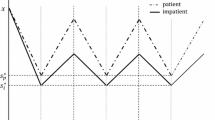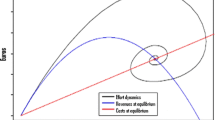Abstract
We propose the concept of a pooling fishery system with a competitive sharing rule as a remedy for the tragedy of the commons without the need to consider the free-riding problem or dissatisfaction of more skillful or eager members. Each fisherman receives his share of pooled income according to his level of achievement, relative to those of other members, of pre-agreed common objectives such as the conservation of depleted stocks. After analyzing the system using the game theoretic approach, we examine its performance as a fisheries management system using a computer simulation. In our example, this system was proven to suppress increases in fishing effort by game theoretic interactions among fishermen, to maintain the stock size at a high level, and to increase the average fishing income. Although there is still much scope for improving this system for practical use, the concept of this system has the potential to contribute to the attainment of sustainable fisheries management.











Similar content being viewed by others
References
Hardin G (1968) The tragedy of the commons. Science 162:1243–1248
Clark C (1985) Bioeconomic modeling and fisheries management. Wiley, New York
Clark C (1976) Mathematical bioeconomics: the optimal management of renewable resources. Wiley, New York
Platteau JP, Seki E (2007) Heterogeneity, social esteem and feasibility of collective action. J Dev Econ 83:302–325
Baba O (1998) Pu-rusei to sono mondaiten. (Significance of the pooling system and its problem). In: Kitahara K (ed) Suisanshigen gyogyo no kanrigijutsu. (Aiming at the establishment of fisheries management technology). Koseisha Koseikaku, Tokyo, pp 87–96 (in Japanese)
Gaspart F, Seki E (2003) Cooperation, status seeking and competitive behavior: theory and evidence. J Econ Behav Organ 51:51–77
Kitahara T (1995) Shigenkanri to gemu riron. (Game theory and its application to the fisheries management). In: Kageyama N (ed) Suisankyoiku to suisangakukenkyu. (Fisheries education and fisheries research). Seizando Shoten, Tokyo, pp 157–173 (in Japanese)
Trisak J (2005) Applying game theory to analyze the influence of biological characteristics on fishers’ cooperation in fisheries co-management. Fish Res 75:164–174
Katsukawa T, Matsuda H (2003) Simulated effects of target switching on yield and sustainability of fish stocks. Fish Res 60:515–525
Baba O (1991) Shijogenkai no moto deno gyogyokanri no igi. (The importance of the fisheries management under the limited market). In: Hiroyoshi K, Kase K et al (eds) Gyogyokanrikenkyu (The Research of the Fisheries Management). Seizando Shoten, Tokyo, pp 176–186 (in Japanese)
Hilborn R, Walters CJ (1992) Quantitative fisheries stock assessment: choice, dynamics and uncertainty. Chapman & Hall, London
Acknowledgments
We are grateful to Osamu Baba, Professor of Tokyo University of Marine Science and Technology, for providing a lot of information of the pooling system, and the members of the Yui and Kashimanada Fisheries Cooperative Associations for their sincere cooperation during this research. We also thank Kunio Shirakihara, Professor of Ocean Research Institute, The University of Tokyo, for critical advice about the research. This research was partially supported by a Grant-in-Aid for Scientific Research C (No. 17580155) from the Japan Society for the Promotion of Science (JSPS).
Author information
Authors and Affiliations
Corresponding author
Rights and permissions
About this article
Cite this article
Kaneko, T., Yamakawa, T. & Aoki, I. Fisheries management using a pooling fishery system with a competitive sharing rule as a remedy for the “tragedy of the commons”. Fish Sci 75, 1345–1357 (2009). https://doi.org/10.1007/s12562-009-0160-7
Received:
Accepted:
Published:
Issue Date:
DOI: https://doi.org/10.1007/s12562-009-0160-7




